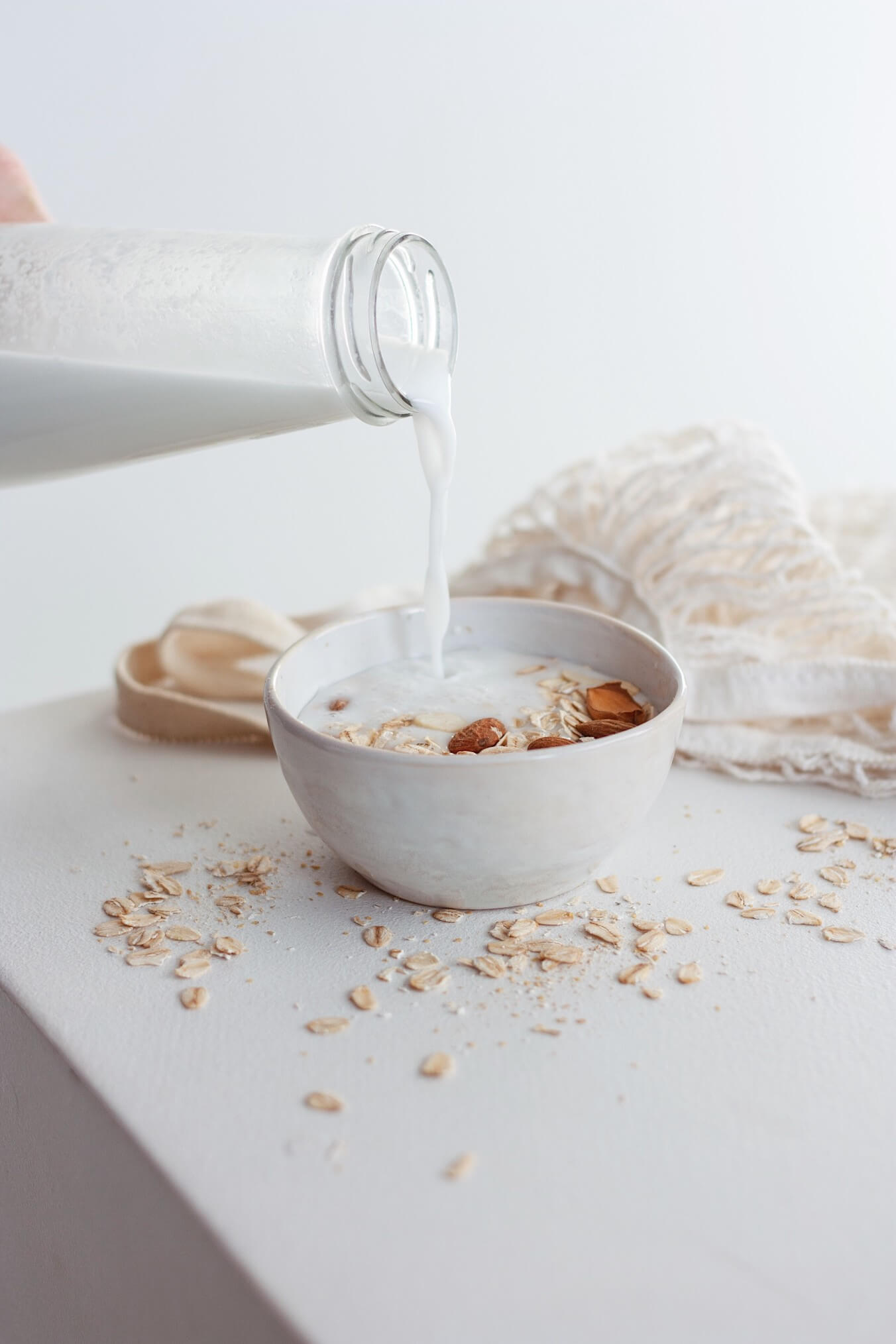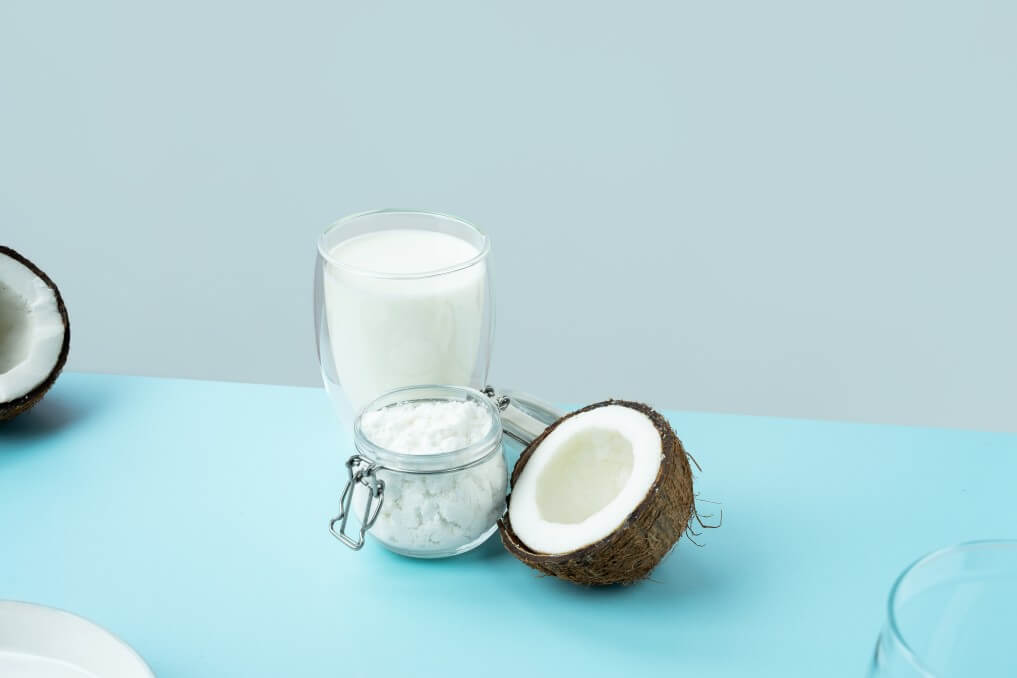Have you ever wondered what the differences are between oat milk vs coconut milk? In this article, we’re unpacking the specifics, such as how they’re nutritionally different, how they each taste, which allergens they contain, and more.
Oat milk is a slightly sweet, creamy plant-based milk rich in dietary fiber and other nutrients, whereas coconut milk has a strong coconut flavor, lots of fat, and more calories overall. There are other qualities of each kind of milk that we’ll unpack below.
To learn more about the pros and cons of drinking oat milk and coconut milk, keep reading. We’ll also discuss which kinds of diets these milk products fit into, as well as their relative caloric content, carbs, etc. Stick around to the end to get answers to some frequently asked questions!
Nutrition - Oat Milk vs Coconut Milk
Oat milk and coconut milk are relatively similar in terms of their protein content, but other than that, their nutritional profiles are quite different.
Take a look at the following nutrient factors that differentiate the two plant-based types of milk, based on information from the United States Department of Agriculture:
1 Cup | Oat Milk | Coconut Milk |
|---|---|---|
Calories | 120 | 150 |
Protein | 3g | 2g |
Fat | 5g | 15g |
Carbohydrates | 16g | 2g |
Calories
Among the different kinds of plant-based milk - including oat, pea, hemp, coconut, soy, almond, and others - oat milk and coconut milk both have relatively high caloric contents. In a one-cup serving of oat milk, there are about 120 calories.
On the other hand, the same serving size of coconut milk has roughly 150 calories.
This difference is a big reason that coconut milk isn’t usually thought of as the healthiest plant-based milk option. And between oat and coconut milk, oat milk may be a healthier choice if you want to lower your caloric intake.
Protein
Protein is somewhat similar when we compare oat milk and coconut milk, but oat milk yields more overall. A single cup of oat milk has roughly 3g of protein, whereas a single cup of coconut milk has closer to 2g of protein.
Neither of these plant-based milk options beats out traditional milk, however, which has a whopping 8g of protein per one-cup serving.
Instead, oat milk and coconut milk both contain other nutrients that you can benefit from, which we’ll get into next.
Fat
Next, let’s compare the fat content in both oat milk and coconut milk because it does stand out compared to other milk alternatives.
In a single cup of oat milk, you’ll consume about 5g of fat. In a single cup of coconut milk, you’ll consume closer to about 15g of fat.
What’s more is that most of the fat in coconut milk is saturated, which isn’t the most healthy for your cholesterol levels and overall heart health.
In oat milk, however, the fats are not saturated as they would be in dairy or coconut milk.
Carbs
There is also a notable difference in how many carbs you’ll be consuming when you drink coconut milk vs oat milk.
Oat milk is far richer in carbohydrates, considering the fact that it’s derived from a cereal grain.
A cup of oat milk has about 16g of carbohydrates, whereas a cup of coconut milk has closer to just 2g of carbohydrates.
This is why some individuals following low-carb diets (like the keto diet) can comfortably drink coconut milk but not oat milk.
Of those carbs in oat milk, 2g per cup consist of dietary fiber, and 7g per cup consist of sugar. Of the 2g of carbs in coconut milk, there are 0 g of dietary fiber.

Calcium
Note that oat milk contains some calcium content, while coconut milk does not.
Considering the fact that calcium is one of the main reasons that people drink dairy milk in the first place, choosing a plant-based alternative that also has calcium limits your choices. In one cup of oat milk, you’ll consume 350mg of calcium.
This is comparable to the calcium content in 1% dairy milk, which usually adds up to about 305mg of calcium.
So, drinking oat milk is actually richer in calcium than dairy, and it beats out coconut milk since coconut milk has no calcium.
Other Vitamins and Minerals
Aside from calcium, plant-based milk products are often also rich in other nutrients like vitamins and minerals.
In oat milk, for example, you’ll find some potassium and Vitamin B12.
A cup of oat milk has about 1.2 µg of Vitamin B12 and 389 mg of potassium.
Vitamin B12 is important in promoting DNA synthesis, as well as cell energy production.
It’s also useful for individuals who have Vitamin B12 deficiencies. Oat milk also contains some zinc, which is important for immune health, and magnesium.
Conversely, coconut milk does not contain Vitamin B12, but it does have a bit of sodium (about 60-65 mg per cup). It also contains traces of iron.
Here's a video from Healthline that goes into detail on the importance of Vitamin B12.
Taste
When you cook with coconut and oat milk, add them to your beverages, and simply drink them plain, there is a stark flavor difference.
While most plant-based milks have a plain, somewhat mild taste, coconut milk actually takes on the taste of coconut.
Oat Milk
In oat milk, you will find a mild flavor similar to that of cow’s milk, but it will be slightly sweeter.
This is due to the relatively high sugar content in oat milk.
Oat milk is also known for having notes of nuttiness in its flavor profile.
While you might go into drinking a cup of oat milk thinking it will taste like oat milk or oat cereal, you’d be mistaken.
Related: What Does Oat Milk Taste Like?
Coconut Milk
Coconut milk is notorious for its coconut taste, which deters some people from using it in recipes, cups of coffee, bowls of cereal, etc.
However, coconut milk also has a pretty sweet flavor, which makes it ideal for adding to coffees, lattes, and other sweet foods and drinks.
Texture
Oat milk and coconut milk also differ in terms of their textures, which makes a difference when you’re cooking with them and stirring them into beverages.
Both are creamy and pretty smooth, but how do they vary?
Oat Milk
Oat milk is a very smooth and creamy plant-based milk option. It is often compared to cow’s milk in terms of texture, but it’s not quite as thick as, say, whole milk.
If you make homemade oat milk, you might incur an issue with pulp once you refrigerate the milk.
This is because the oat particles settle if you don’t have a way to thoroughly strain them out of the drink.
Coconut Milk
Coconut milk is also pretty smooth and creamy, but it’s different from cow’s milk and oat milk.
It’s fairly thick, but depending on what brand and product you buy, coconut milk could be thinner in texture.

Allergens and Dietary Information
While both of these milk options are plant-based and mostly allergen-free, they differ in terms of how friendly they are to most dietary restrictions.
Coconut milk seems to be the safer option in this realm, as you’ll see below.
Allergen | Oat Milk | Coconut Milk |
|---|---|---|
Soy | No | No |
Lactose | No | No |
Gluten | No * | No |
Peanuts | No | No |
Tree Nuts | No | No * |
Oats | Yes | No |
Eggs | No | No |
Note that, although coconut is not technically a tree nut, some individuals with tree nut allergies also exhibit allergic reactions to coconut.
Further, oat milk, while naturally gluten-free, runs the risk of gluten cross-contamination in the production process.
Diet-Friendliness
Oat milk does not fit within the guidelines and restrictions of the following diets:
Whole30 diet
It is, however, an acceptable vegan and vegetarian milk choice.
On the other hand, coconut milk does fit within the guidelines and restrictions of the following diets:
Paleo diet
Keto diet
Whole30 diet
On top of that, coconut milk is also vegan- and vegetarian-friendly.
Oat Milk Pros & Cons
Finally, let’s consider the advantages and potential downsides to drinking oat milk and/or coconut milk.
Both are suitable plant-based alternatives to cow’s milk, but they have different nutritional benefits, flavors, and diet-friendliness.
Pros
Oat milk is primarily beneficial as a plant-based milk because it’s vegan-friendly and vegetarian-friendly, and it’s relatively low in calories.
Although it’s somewhat on the sweeter side, it has a beneficial amount of dietary fiber, which supports healthy digestion.
Other pros of drinking oat milk include:
High Vitamin B12 content
Rich in calcium content
Lactose-free
Free of most food allergens
Decent source of protein
Ideal for adding to coffee, cereal, and other recipes
Rich and creamy texture
Furthermore, it’s pretty easy to find oat milk in stores these days since it has grown in popularity. You can even find it offered at coffee shops and chains like Dunkin Donuts and Starbucks.

Cons
Oat milk isn’t without its downsides, though, including the following:
More expensive than cow’s milk
Not keto- or paleo-friendly
Relatively high in carbohydrates and fat
Not edible for those with oat allergies
Poses a risk to Celiac individuals since it can be cross-contaminated
Coconut Milk Pros & Cons
So, why would someone want to drink coconut milk? There are benefits and downsides to choosing this plant-based milk, as always.
Pros
The biggest benefits of drinking coconut milk include the naturally sweet flavor that is rich, creamy, and thick in texture.
This mimics the quality of cow’s milk.
Coconut milk also contains important nutrients, such as iron. Other pros of coconut milk include:
Relatively low in carbohydrates
Keto-friendly and paleo-friendly
Free of food allergens (unless you have a tree nut allergy that also exhibits reactions to coconut)
Works well in many recipes
Free of lactose
Easy to find in stores
Cons
There are some cons to drinking coconut milk, too, including:
A lack of B12 that you’ll find in oat milk
A lack of dietary fiber that you’ll find in oat milk
High in calories and fat content
Not the best for sensitive stomachs

FAQs About Oat and Coconut Milk
Can people with Celiac drink coconut milk?
Yes, because coconut is a naturally gluten-free fruit, it is safe for gluten intolerant and Celiac individuals to drink.
However, it’s worth noting that some plant-based milk products undergo cross-contamination with gluten in the production process, and they sometimes contain gluten-related additives to look out for on the label.
Can you substitute coconut milk for milk in cooking?
Fortunately, coconut milk can be used as a dairy substitute in many recipes, and you don’t have to worry about any weird conversion ratios.
For one part of dairy milk you would normally use, replace it with one part of coconut milk.
Can you substitute oat milk for milk in cooking?
Yes, you can also substitute your dairy milk with oat milk in many recipes, both savory and sweet.
There is a 1:1 conversion ratio, so you don’t need to worry about changing your measurements. Keep in mind that oat milk needs to be heated slowly so that it doesn’t curdle.
How long are oat milk and coconut milk good for?
Both plant-based milks have relatively short shelf lives.
Oat milk only lasts for about 5-7 days in the refrigerator after breaking the seal.
Coconut milk lasts about one week in the refrigerator after breaking its seal.
Conclusion
When you consider oat milk vs coconut milk, there are notable differences in nutrient content, taste, texture, and overall pros and cons of drinking.
Note that coconut milk is not as naturally healthy as oat milk due to its caloric content, but it is a better choice if you’re on a keto or paleo diet.
There are benefits and downsides to drinking plant-based milks, and hopefully our guide has given you some insights into those factors for oat milk and coconut milk.
